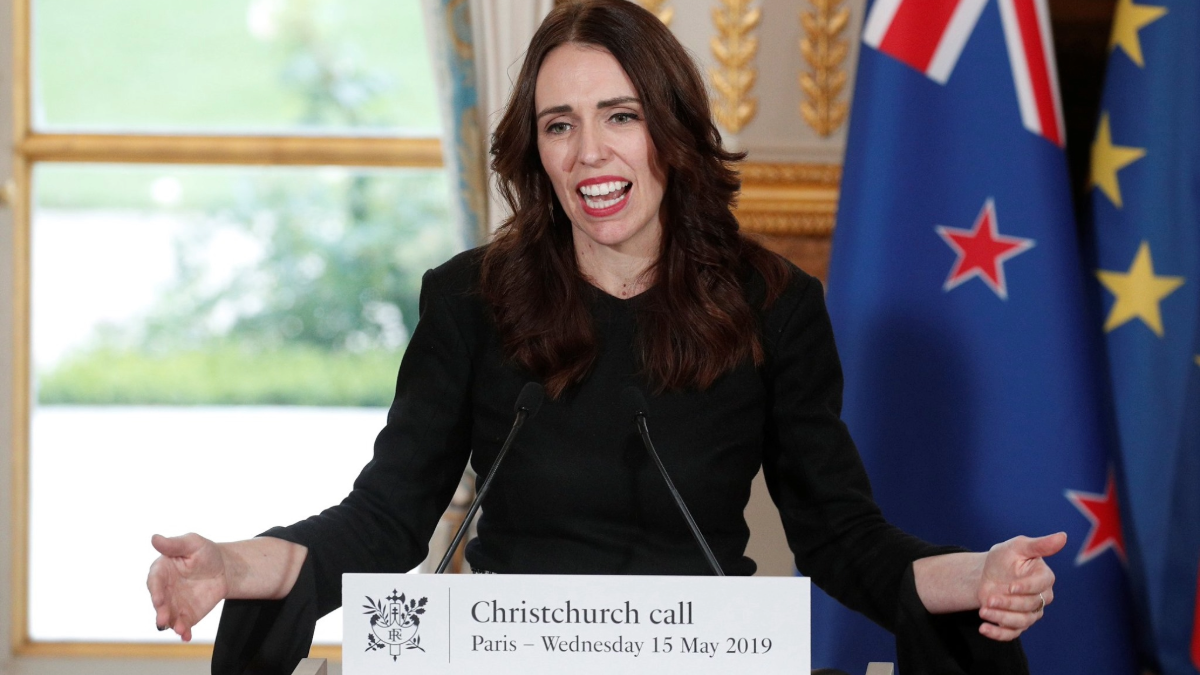The Christchurch Call to Action Loses Its Government Funding – That’s a Good Thing
Rachel Wolbers / Jul 2, 2024
Former New Zealand Prime Minister Jacinda Ardern at a 2019 meeting of the Christchurch Call to Action. Source
Over the past five years, governments have tried to reign in the tech behemoths by regulating the types of content shared on social media platforms. However, on July 1, the New Zealand government did the opposite. Instead of regulating, the government transitioned its Christchurch Call to Action to eliminate terrorist and violent extremist content online into a non-governmental organization. It may seem counterintuitive that the government can have a greater impact on content moderation policies by relinquishing its role over tech companies, but this move was necessary to ensure the Call’s success for years to come.
The Christchurch Call to Action (the Call) was launched five years ago in the aftermath of a horrific attack by a gunman on two New Zealand mosques, killing 51 worshippers. The shooter carefully planned to live-stream his 17-minute attack on Facebook to go viral. And it did. In the first 24 hours, platforms such as YouTube, Twitter, Facebook, and Reddit removed millions of copies of the video. Reeling from the crisis, the New Zealand and French governments partnered with other governments, technology companies, and civil society to set up the Christchurch Call to Action, a multi-stakeholder initiative, to ensure something like this could never happen again.
At its core, the Call is a set of 25 commitments made by tech companies and governments to stop the spread of terrorist and violent extremist content (TVEC) online. The Call’s initial structure followed a familiar playbook for internet policy-wonks by creating a multi-stakeholder initiative where governments and tech companies work closely with civil society and academia to find “whole-of-society” solutions to intractable problems. In the five years since the creation of the Call, the group has developed new crisis response protocols, helped companies write robust content moderation policies, launched research projects into algorithmic bias and continuously demanded more action from all stakeholders to root-out TVEC online.
Given these accomplishments, it may have surprised some when the New Zealand government announced in May that it would no longer fund the Call. Instead, it will become a non-profit organization – relying on contributions from charities and tech companies like Meta and Microsoft to support its work. Some critics have said this was a political move (Ardern’s party lost badly in the 2023 elections), while some argue that the tech industry has lost interest, or that the Call has not lived up to expectations. While there is some truth in these claims, it is also true that this new funding structure has the potential to radically improve the functioning of the Call.
Protecting the Call’s Multistakeholder Model
Repurposing the Call as a self-funded non-profit is critical to set the Call up for greater impact globally for three key reasons.
First, a non-profit structure ensures the Call remains a multi-stakeholder initiative and not dominated by governments or multilateral institutions like the United Nations. When creating the Call, the New Zealand government understood that efforts made by regulators acting alone will not effectively stop the spread of TVEC online. Indeed, since the earliest days of the internet governments have passed laws banning terrorist content and criminalizing the platforms who unwittingly host it. But democratic governments cannot easily ban “lawful but awful” speech without infringing on rights to free expression and national government officials cannot effectively censor speech on the internet, which was designed to promote the free flow of information across geographical borders. Therefore, when trying to stop the spread of TVEC online, it is necessary for like-minded governments to work together. But they can’t work alone. This new funding model will force governments and tech companies to buy into a process for reaching global solutions, rather than addressing local problems.
Second, a shift in funding structure demonstrates the maturity of the organization and follows the trajectory of other standard-setting institutions in the internet era. By incubating the program in its first years, New Zealand has built trust among parties and allowed the project to prove success before a multi-stakeholder group takes charge. New Zealand is following the path of many other multi-stakeholder initiatives. For example, both the Internet Engineering Task Force (IETF) and the Internet Corporation for Assigned Names and Numbers (ICANN) started as niche government-run projects but later developed into robust multi-stakeholder initiatives. While not household names, the IETF and ICANN are fundamental to a functioning global internet. The Call has tried to mirror the funding structures of these multi-stakeholder initiatives to ensure it can remain a convener of diverse stakeholders and continue its mission to drive consensus towards solutions that stop the spread of TVEC online while upholding the freedom of expression.
Third, if the work of the Call is to truly help address global content moderation challenges, the taxpayers of New Zealand cannot be the only people with “skin in the game.” Critics of the Call have said that the large global tech platforms can easily disregard their commitments with no accountability to users, shareholders or regulators. Therefore, ensuring that companies buy into this process can help separate the free-loaders interested in a public relations exercise from those seeking meaningful reforms to stop the spread of TVEC. Cynics argue that the costs of supporting the Call will be pennies to the industry giants, many of which already support trust and safety councils, security committees, or membership in consortia such as the Digital Trust and Safety Partnership. Tech firms may not always follow the recommendations of such groups; notably, Meta’s Oversight Board (where I worked previously) has received over $280 million from the company, but Meta has only implemented its recommendations 71% of the time. However, for publicly-traded companies, investing in the work of the Call can drive accountability.
What’s Next for the Call?
The New Zealand government’s decision to stop funding the Call is exactly the transition needed to grow the initiative. However, that doesn’t mean the Call is on a fast-track to success without a lot of hard work. Former New Zealand Prime Minister Jacinda Ardern, in her new role as Patron of the Call, will need to carefully build legitimacy and drive consensus-based solutions. Otherwise, the Call will fade from existence. Her team can do this by using the new sources of funding to drive recruitment of stakeholders from tech and civil society; raise awareness of the work the Call is doing; and increase the organization’s capacity to hold companies and governments accountable to the commitments they made.
Even if the Call can achieve those goals, it must remain flexible and relevant. When policymakers were talking about terrorist content five years ago, they were primarily discussing how to stop the spread of ISIS propaganda and beheading videos. However, the events of March 15, 2019 fundamentally altered that discussion, and tech companies set up reporting tools for more insidious types of terrorism – including the rise of the far right. Indeed, the Christchurch shooting quickly became a rallying cry for white supremists worldwide and inspired attacks from Buffalo, New York to Halle, Germany. To combat this, the large platforms instituted new rules which forced the terrorists inspired by the Christchurch shooter to turn to less-moderated corners of the internet such as 4chan, Gab, and Parler. Now, with the widespread availability of generative AI tools, the stakeholders working on the Call need to adapt their work to ensure these new technologies are not aiding the spread of TVEC online. The beauty of a multi-stakeholder initiative is that the organization can easily adapt to take on new projects and bring in experts from all corners of society.
New Zealand had a moral authority to start the Call following the horrific Christchurch attack. But its ultimate success depends on the ability of the Call to adapt to the ever-changing nature of the internet. At a time when multi-stakeholderism is being questioned by multilateral organizations like the United Nations, the Call can stand by the work it has done to fundamentally address thorny speech and technology problems through a whole-of-community approach.
Authors
